 རྒྱ་གར་ཕྱི་སྲིད་ལས་ཁང་གིས་གསར་ལམ་ཁག་ཏུ་བརྗོད་དོན། རྒྱ་གར་ནང་ཁུལ་གྱི་ཕྱི་བསྐྱོད་ཐོངས་ཆེན་ཞུ་མཁན་ཚང་མར་ས་ཁུལ་དང་རིགས་རྒྱུད་ཀྱི་དབྱེ་བ་མེད་པར་གཅིག་མཚུངས་སྒོས་སྤྲོད་དགོས་པས་ང་ཚོའི་ལྟ་ཚུལ་དང་ལངས་ཕྱོགས་ལ། རྒྱ་ནག་གཞུང་གིས་རྒྱུ་མཚན་ལྡན་པའི་དོ་སྣང་ཡོང་བར་འགྲེལ་བརྗོད་བྱས་ཟིན་ནའང་། རྒྱ་ནག་དཔོན་རིགས་ཚོས་འདིའི་ཐད་བརྡ་ལན་ཅི་ཡང་བྱས་མེད་པ་རེད། ཅེས་བརྗོད་ཡོད་འདུག
རྒྱ་གར་ཕྱི་སྲིད་ལས་ཁང་གིས་གསར་ལམ་ཁག་ཏུ་བརྗོད་དོན། རྒྱ་གར་ནང་ཁུལ་གྱི་ཕྱི་བསྐྱོད་ཐོངས་ཆེན་ཞུ་མཁན་ཚང་མར་ས་ཁུལ་དང་རིགས་རྒྱུད་ཀྱི་དབྱེ་བ་མེད་པར་གཅིག་མཚུངས་སྒོས་སྤྲོད་དགོས་པས་ང་ཚོའི་ལྟ་ཚུལ་དང་ལངས་ཕྱོགས་ལ། རྒྱ་ནག་གཞུང་གིས་རྒྱུ་མཚན་ལྡན་པའི་དོ་སྣང་ཡོང་བར་འགྲེལ་བརྗོད་བྱས་ཟིན་ནའང་། རྒྱ་ནག་དཔོན་རིགས་ཚོས་འདིའི་ཐད་བརྡ་ལན་ཅི་ཡང་བྱས་མེད་པ་རེད། ཅེས་བརྗོད་ཡོད་འདུག
ཀཤཱི་མིར་ས་ཁུལ་ནི་དུས་ཡུན་རིང་པོའི་ནང་རྩོད་རྙོག་ཅན་གྱི་ས་ཁུལ་ཅིག་ཏུ་གྱུར་ཡོད་པ་དང་། རྒྱ་གར་དང་པཱ་ཀི་སི་ཐན་གཉིས་ས་ཁུལ་དེའི་བདག་དབང་ཐད་དམག་འཁྲུག་ཐེངས་གཉིས་བྱུང་མྱོང་ཡོད་ལ། ད་ལྟ་ས་ཁུལ་དེ་རྒྱ་གར་དང་པཱ་ཀི་སི་ཐན་རྒྱལ་ཁབ་གཉིས་ཀྱི་མངའ་ཁོངས་སུ་ཁག་གཉིས་ལ་བགོས་ཡོད་པ་རེད། དེ་བཞིན་རྒྱ་ནག་གིས་ཀཤཱི་སྨིར་གྱི་ས་ཁུལ་ཁག་ཅིག་གི་བདག་དབང་ཁོ་ཚོར་ཡོད་ལུགས་བརྗོད་ཀྱིན་ཡོད་ལ། དེ་སྔོན་རྒྱ་གར་དང་རྒྱ་ནག་གཉིས་ཀྱིས་ཕྱི་ལོ་ ༡༩༦༢ ལོར་ཧི་མ་ལ་ཡའི་རི་བརྒྱུད་ཀྱི་མཐའ་མཚམས་ས་ཁུལ་གྱི་བདག་དབང་གནད་དོན་ཐད་དམག་འཁྲུགས་ཐེངས་གཅིག་བརྒྱབས་མྱོང་ཡོད་པ་རེད།




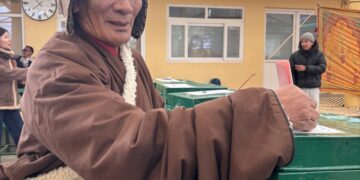
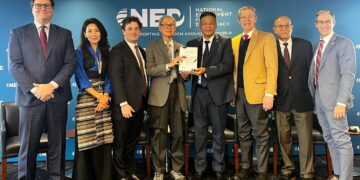
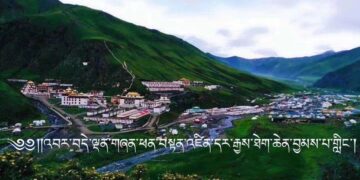

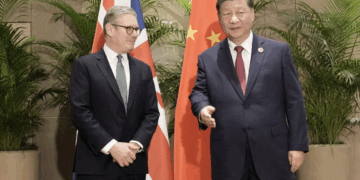
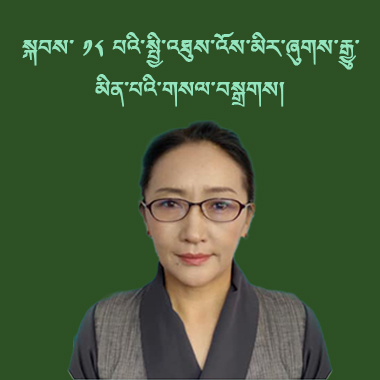
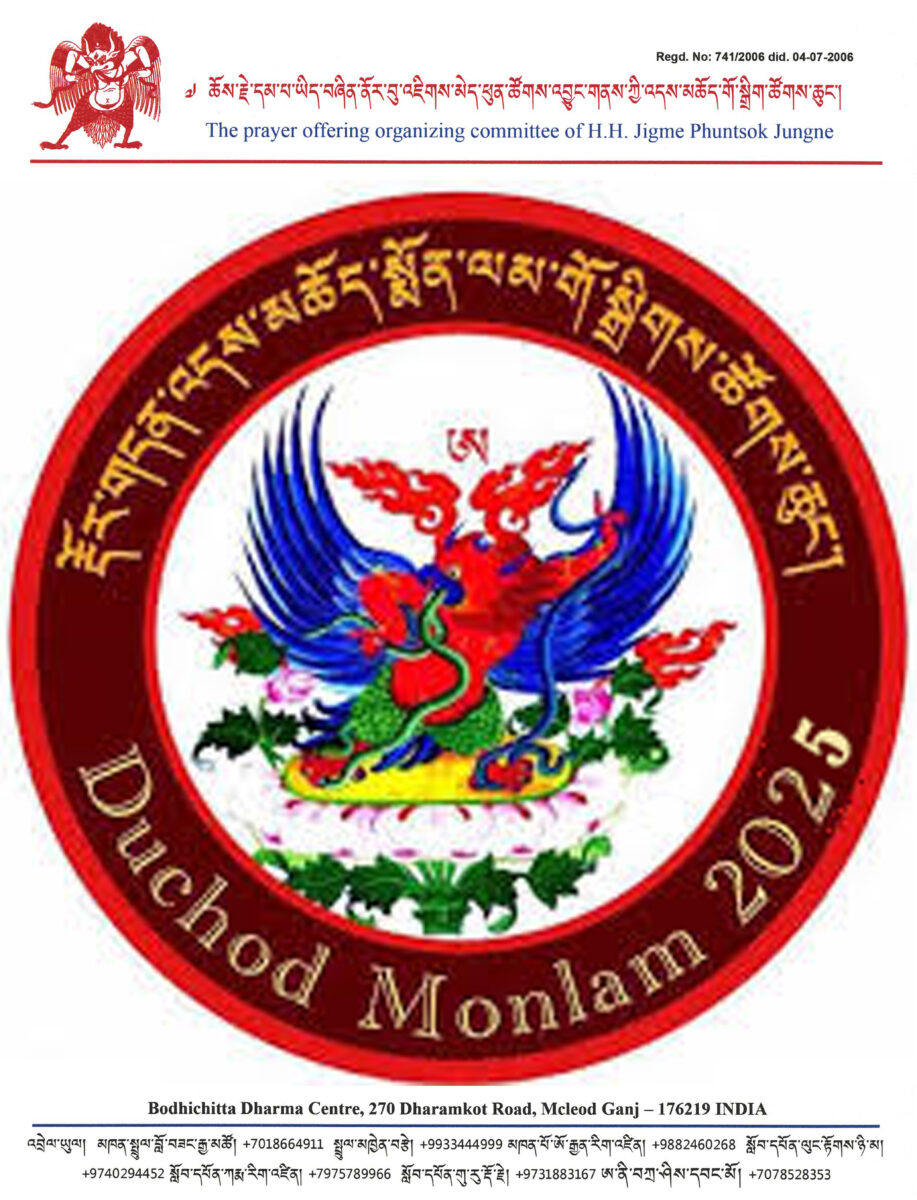
ལགས་སོ་ཤ་ཁྲག་རུས་གསུམ་་ཁྱེད་ཀྱིས་ང་ལམ་སྟོན་གནང་བ་ཐུགས་རྗེ་ཆེ།།
ད་རྒྱ་གར་ལའང་མ་སྡིགས། རྒྱ་ནག་ལའང་མ་སྡིགས། ཁཽ་གཉིས་ཀྱིས་ཅི་བྱེད་ན་བྱེད་དུ་ཆུགས། ཁོ་གཉིས་ཀ་དོན་དངོས་སུ་བོད་ལ་ཤ་ཚ་ཆེ་གི་མ་མེད།
རྒྱ་གར་གྱིས་འདི་ལྟར་མུ་འཐུད་དུ་རྒྱ་ནག་ལ་ཁ་ཡག་ངོ་དགའ་བཤད་བསྡད་ན་ཀ་ཤི་མེ་ཨར་ཕར་ཞོག ཉིན་གཅིག་རྒྱ་གར་གྱི་རྒྱ་ས་ལྡི་ལི་ཡང་རྒྱ་ནག་གི་ཁོང་ཚོའི་ཡིན་མི་ཟེར་བའི་ངེས་བ་མེད་ལ། ཆུ་མ་ཡོང་གོང་ལ་རག་དང་། དགྲ་མ་ཡོང་གོང་དོགས་ཟེར་བའི་དཔེ་ལྟར། མེ་སྟག་ཆུང་ས་ནས་བསད་ན་ཡག་གི་རེད།
ཟླ་སྔོན་མའི་ནང་རྒྱ་ནག་གི་ས་སྲུང་དམག་མི་ས་མཚམས་བརྒལ་ཏེ་རྒྱ་གར་གྱི་ས་ཐོག་ནས་མེ་མདའ་བརྒྱབ་པ་དང་རྒྱ་གར་ཡུལ་མི་རྣམས་ལ་ཞེ་སྣང་སྐུལ་བའི་གནས་ཚུལ་གོ་རྒྱུ་འདུག
ད་དུང་ཨ་རུ་ན་ཅལ་རྒྱ་ནག་གི་ས་ཁོངས་ཡིན་པ་དང་༧གོང་ས་མཆོག་ས་དེ་ལ་ཕེབས་ན་རྒྱ་ནག་གཞུང་གིས་ངོ་རྒོལ་ཡོད་ཚུལ་སོགས་བརྗོད་འདུག
རྒྱ་ནག་གི་ཧམ་པ་འདི་ངོ་མ་་་་་་་་་་་
ནོར་བུ་རྒྱལ་མཚན་ལགས། བྱུང་ན་གནས་ཚུལ་དང་གསར་འགྱུར་འཁུར་ནས་འོང་དུས། རང་ཉིད་ཀྱི་ངོ་སྤྲོད་བྱེད་ཡུལ་དེ་དག་ནི་རང་རིགས་བོད་སྐད་དང་བོད་ཡིག་ལ་དུངས་པ་ཡོད་མཁན་དང་བོད་ཡིག་གི་དྲ་ཚིགས་ཤིག་ལ་རང་ཉིད་ཀྱིས་གང་ཞིག་འདྲེན་བཀོད་བྱེད་ཀྱི་ཡོད་པ་ཐུགས་སུ་བཟུང་དེ། རྗེས་ཕྱོགས་སྒྱུར་ནས་འཁུར་ཡོང་ཐུབ་ཀྱི་མེད་ན། དབྱིན་ཡིག་འདི་རུ་འཁུར་ནས་མ་ཕེབས་རོགས། འདི་ནི་བོད་ཡིག་གི་དྲ་ཚིགས་གཙང་མ་ཞིག་ཡིན་པ་སྐུ་ཉིད་ཀྱིས་མཁྱེན་གསལ་རེད་ལགས། དབྱིན་ཡིག་ཤེས་ན་ཡག་པོ་རེད་མོད། རང་སྐད་ལས་གཞན་སྐད་ལ་ཐོངས་ཆེན་བྱེད་པ་ལ་དངོས་ནས་གུས་བཀུར་བྱེད་ཐུབ་ཀྱི་མི་འདུག་ལགས།
what is this?
Treading carefully on China and Tibet
Boston Globe[Sunday, October 04, 2009 16:39]
By David L. Phillips
THE OBAMA administration achieved a rare moment of bipartisanship in deciding not receive the Dalai Lama at the White House this week. Both Democrats and Republicans found common ground criticizing the administration for kow-towing to China. But the decision to defer an Oval Office meeting is based on careful calculation. Instead of a photo-opportunity with the Dalai Lama, the administration believes it would be better to focus on diplomacy to restart negotiations between the Chinese government and the Dalai Lama’s envoys that were suspended last year.
Beginning in 2002, the Dalai Lama’s envoys made their first of seven trips to China. Initial discussions focused on building confidence. The envoys reaffirmed the Dalai Lama’s renunciation of independence in lieu of “genuine autonomy’’ consistent with “the one-China line.’’ They insisted that China’s territorial integrity would be strengthened – not weakened – through power sharing with Tibetans.
The Chinese government was initially apprehensive that autonomy would be a step on the path to independence. But after repeated assurances, China’s tone and message gradually changed. They acknowledged the need to “perfect’’ arrangements for autonomy; “adapt’’ measures to local conditions; and “improve’’ the country’s legal system.
With the atmosphere improving, the envoys submitted a concept paper defining the meaning of “genuine autonomy.’’ The paper included specific proposals for local control over governance and cultural, religious, economic, and environmental affairs. It also suggested that autonomy should be uniformly applied in all parts of western China where ethnic Tibetans reside.
Chinese officials balked at many of the proposed provisions. They saw the proposal as a Trojan horse for creating a “greater Tibet’’ in designated Tibetan autonomous areas Qinghai, Gansu, Yunnan, and Szechuan provinces as well as the so-called Tibet Autonomous Region. It was rejected out-of-hand.
The failed negotiations, combined with China’s harsh rule, precipitated protests by Tibetans in March 2008. Demonstrations started in the monasteries and escalated into a larger rebellion that quickly spread across the Tibetan plateau.
Fast-forward to the present. Obama has a long list of items to discuss with President Hu Jintao when they meet next month in Beijing. He knows that multilateralism cannot succeed without China’s cooperation on a whole host of issues, including the global economic crisis, global warming, and nuclear nonproliferation.
However, Obama should not turn a blind eye to human rights in China. He should point out that stability is essential for social and economic development, and that China’s stability will give it greater self-confidence on the world stage.
Obama should emphasize that, absent progress, Tibetans will become radicalized and the present opportunity to negotiate an autonomy arrangement that strengthens China’s territorial integrity could disappear. The Dalai Lama is best placed to endorse an arrangement that advances China’s interests as well as the interests of Tibetans. In exchange for verifiable autonomy, the Dalai Lama would put his moral authority behind an agreement that precludes separation or Tibetan independence.
Restarting negotiations with the Dalai Lama’s envoys would be a good first step. But talks are not enough. The United States must be prepared to closely monitor talks between Beijing and the Tibetan envoys, give ideas, and use its influence to sustain momentum when dialogue falters.
To be sure, there are risks in deferring the Dalai Lama’s visit from October to December. China could reject Obama’s advice to restart negotiations or it could resume negotiations without the prerequisite sincerity to realize a solution. China might also claim that it intimidated the Obama administration, thereby making it harder for other heads of state to resist its demarches.
One thing is sure. China will not resume negotiations unless Obama can convince Hu that changing course is in China’s national interest. While diplomacy is more difficult, engagement has the potential to be far more effective than the immediate gratification of a photo-op. That can wait until mid-December, when plans are in the works for Obama to receive the Dalai Lama in a fashion becoming the Tibetan leader’s stature.
David L. Phillips is director of the Program on Conflict Prevention and Peacebuilding at American University.
རྒྱ་གཞུང་ལ་མི་འཇིགས་པའི་སྤོབས་བ་དེ་ཇེ་ཆེ་དང་། དེ་སྔོན་བལ་ཡུལ་དེ་བླུན་པོ་ཆུ་སྣ་གར་ཁྲིད་བཟོས་ཟིན་ནས། ད་རྒྱ་གར་ཡང་དེ་འདྲ་བཟོ་བསམ་ནས་ཐབས་ཤེས་གང་སར་ནས་བཙལ་གྱིན་ཡོད་པ་འདི་རྒྱ་གར་གྱིས་ཤེས་དགོས་ཀྱི་རེད།
གང་ལྟར་བོད་ས་ཡོངས་རྫོགས་རྒྱ་ནག་གིས་ཟོས་ནས་སྡད་པའི་སྐབས་འདིར། བོད་ཀྱི་ས་ཆ་ཆ་ཚང་རྒྱ་མའི་གཞུང་གིས་བདག་པོ་རྒྱབ་ན་མ་འོང་པར་བོད་རང་དབང་ཐོབ་པའི་གོ་སྐབས་གཅིག་བྱུང་ན། ཡག་ཤོས་རེད།
ཀ་ཤི་མི་རི་གཅིག་པུ་མ་རེད། ཤར་ཕྱོགས་འབྲས་ལྗོངས་དང་། ལ་དགས་ག་ཤ་ཁུ་ནུ་སྤུ་སྡིས་སོགས་ཀྱང་། སྔོན་གྱི་དུས་སུ་བོད་ས་དང་གནས་དེར་སྡོད་མི་རྣམས་བོད་མི་ཡིན་པ་དེ་ཕར་བལྟས་ཚུར་གསལ་རེད་མི་འདུག་པས། གལ་སྲིད་བོད་རྒྱའི་ཆ་ཤས་རེད་ཟེར་ཁས་ལེན་ཟིན་པའི་རྗེས་སུ། ས་ཆ་འདི་དག་ཀྱང་རྒྱས་ཆ་ཤས་ཡིན་པ་ཁས་ལེན་ཟིན་པ་མ་རེད་པས།
ད་དུང་འབྲུག་ཡུལ་དང་། བལ་བོའི་ཁ་ཞབས་སུ་ཡོད་པའི་ཧི་མ་ལ་ཡིའི་རི་བརྒྱུད་དུ་ཡོད་དོ་ཅོག་གཅིག་མཚུངས་རེད། གལ་སྲིད་རྒྱུ་མཚན་བཤད་སའི་དྲངས་བདེན་གྱི་གླེང་སྟེགས་ཤིག་མཆིས་ན། བོད་ཟེར་བ་རྒྱ་ལས་ཐ་དད་ག་འདྲ་ཡིན་མིན་དེ་ལས་སླ་བོ་བྱེད་ནས་བཤད་ཐུབ་ཀྱི་རེད
སྐར་ཁྲི་བཙན་ལ་རྒྱབ་བསྐྱོར་ཡོད། ༡༩༥༤ལོར་རྒྱ་གར་གྱིས་རྒྱ་ནག་ལ་བོད་ཐོག་བདག་དབང་ཡོད་པར་ངོས་ལེན་བྱས་པའི་ཉེར་ལེན་གྱིས་དེང་སྐབས་ཨ་རུ་ན་ཇལ་གཙོ་བྱས་ཡུལ་ལུང་ཁག་ལའང་རྒྱ་ནག་གིས་བདག་དབང་ཡོད་ཚུལ་བརྗོད་ཀྱིན་པ་རེད། དངོས་གནས་རྣམ་སྨིན་ཟེར་བ་འདི་འདྲའི་དུས་ཐོག་ཏུ་ཡོང་རྒྱུ་ཡོད་པ་ཞིག་ཡིན་པ་སུས་ཤེས་སམ། བྷ་བྷུ་ཚང་གིས་བོད་ལ་བདག་པོ་མི་རྒྱག་རང་རྒྱག་ཆགས་ཀྱིན་པ་མིན་ནམ།
དོན་དག་གཞན་ཞིག་ཡོད་པ་ནི་རྒྱ་ནག་གཞུང་ཚབ་ཁང་གིས་རྒྱ་བལ་འབྲུག་གསུམ་དུ་སྡོད་པའི་བོད་མི་ལ་ཐད་ཀར་ཡུལ་བསྐོར་ལག་འཁྱེར་སྤྲོད་ཀྱིན་པའི་ཁར། ཕྱི་རྒྱལ་ཁག་ནས་ཀྱང་འགོ་འཛུགས་བྱས་ཟིན་སྐད། དེ་བས། གནད་དོན་འདི་ཇི་ལྟར་བྱེད་འོས་སམ།
ཨ་རོ་་་་་སྐར་ཁྲི་བཙན་དེ་འདྲ་ལབ་ན་ཏག་ཏག་ཅིག་རེད་དམ།
སྐད་ཆ་བསམ་ནས་བཤད་ན་ཡག་ནི་རེད།
ད་དུང་འགན་འཁུུར་ནས་བཤད་རྒྱུ་གལ་ཆེན་པོ་རེད།
འདི་ད་རྒྱ་གར་ལ་སྡུག་གྱོང་རེད། ལོ་རྒྱུས་ལ་འཁྱོག་བཤད་བྱས་པའི་རྒྱུ་འབྲས་འཁོར་ནི་རེད འགྱོད་པའི་སྨན་ནི་ཉོ་རྒྱུ་ཡོད་ནི་མ་རེད ལྟད་མོ་ལྟ་པ